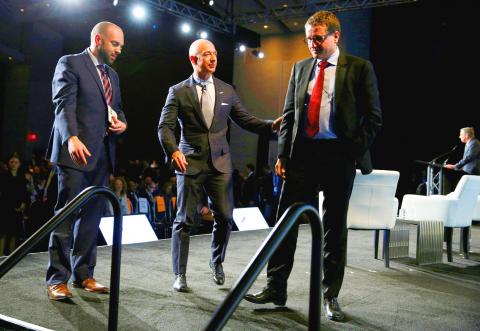Blue Origin, a rocket company owned by Amazon.com Inc CEO Jeff Bezos, has signed France’s Eutelsat SA as its first customer for satellite launch services, Bezos said on Tuesday.
Blue Origin is developing a reusable orbital rocket called New Glenn that is expected to debut before the end of the decade.
“We couldn’t hope for a better first partner,” Bezos said during a keynote address at the Satellite 2017 conference in Washington.

Photo: Reuters
The target date for the first launch is about 2021, Eutelsat CEO Rodolphe Belmer said.
Terms of the contract were not disclosed.
New Glenn is a follow-on program to Blue Origin’s suborbital New Shepard launch system, a rocket and capsule designed to fly payloads and passengers to about 100km above the planet. Test flights with crew members aboard are expected to begin this year.
The company has not yet set a price for rides.
The New Glenn booster is designed to fly itself back to Earth so it can be recovered and reflown, slashing launch costs.
Tech billionaire Elon Musk’s Space Exploration Technologies, more commonly known as SpaceX, also favors this approach.
New Glenn is to have about twice the lift capacity of SpaceX’s current Falcon 9 rocket, with the ability to put about 45,400kg into low-altitude Earth orbits.
Blue Origin is to compete with SpaceX, as well as Lockheed Martin Corp and Boeing Co-owned United Launch Alliance, Europe’s Arianespace SA and other companies, for commercial satellite launch business.
Eutelsat operates a fleet of 39 communications satellites launched by several companies, including SpaceX, whose launches sell for about US$62 million, the company’s Web site showed.
“We think that our role as an industry leader is to stimulate competition so that there is a stream of innovation ... and that access to space is easier,” Belmer said. “When the opportunity of ... New Glenn presented itself, we jumped on it.”
Bezos said his goal was to lower the cost of flights so that millions of people can live and work in space.
His vision is to shift heavy industry into orbit and preserve Earth for human life, while Musk wants to colonize Mars.

Taiwanese suppliers to Taiwan Semiconductor Manufacturing Co. (TSMC, 台積電) are expected to follow the contract chipmaker’s step to invest in the US, but their relocation may be seven to eight years away, Minister of Economic Affairs J.W. Kuo (郭智輝) said yesterday. When asked by opposition Chinese Nationalist Party (KMT) Legislator Niu Hsu-ting (牛煦庭) in the legislature about growing concerns that TSMC’s huge investments in the US will prompt its suppliers to follow suit, Kuo said based on the chipmaker’s current limited production volume, it is unlikely to lead its supply chain to go there for now. “Unless TSMC completes its planned six

Intel Corp has named Tasha Chuang (莊蓓瑜) to lead Intel Taiwan in a bid to reinforce relations between the company and its Taiwanese partners. The appointment of Chuang as general manager for Intel Taiwan takes effect on Thursday, the firm said in a statement yesterday. Chuang is to lead her team in Taiwan to pursue product development and sales growth in an effort to reinforce the company’s ties with its partners and clients, Intel said. Chuang was previously in charge of managing Intel’s ties with leading Taiwanese PC brand Asustek Computer Inc (華碩), which included helping Asustek strengthen its global businesses, the company

Power supply and electronic components maker Delta Electronics Inc (台達電) yesterday said second-quarter revenue is expected to surpass the first quarter, which rose 30 percent year-on-year to NT$118.92 billion (US$3.71 billion). Revenue this quarter is likely to grow, as US clients have front-loaded orders ahead of US President Donald Trump’s planned tariffs on Taiwanese goods, Delta chairman Ping Cheng (鄭平) said at an earnings conference in Taipei, referring to the 90-day pause in tariff implementation Trump announced on April 9. While situations in the third and fourth quarters remain unclear, “We will not halt our long-term deployments and do not plan to

The New Taiwan dollar and Taiwanese stocks surged on signs that trade tensions between the world’s top two economies might start easing and as US tech earnings boosted the outlook of the nation’s semiconductor exports. The NT dollar strengthened as much as 3.8 percent versus the US dollar to 30.815, the biggest intraday gain since January 2011, closing at NT$31.064. The benchmark TAIEX jumped 2.73 percent to outperform the region’s equity gauges. Outlook for global trade improved after China said it is assessing possible trade talks with the US, providing a boost for the nation’s currency and shares. As the NT dollar